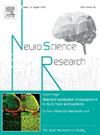Neural substrates of choking under pressure: A 7T-fMRI study
IF 2.4
4区 医学
Q3 NEUROSCIENCES
引用次数: 0
Abstract
Performance decrement under excessive psychological pressure is known as “choking,” yet its mechanisms and neural foundations remain underexplored. Hypothesizing that changes in the internal model could induce choking, we conducted a 7 T functional MRI introducing excessive pressure through a rare Jackpot condition that offers high rewards for successful performance. Twenty-nine volunteers underwent a visual reaching task. We monitored practice and main sessions to map the task's internal model through learning. Participants were pre-informed of four potential reward conditions upon success at the beginning of the main session task. The success rates in the Jackpot condition were significantly lower than in other conditions, indicative of choking. During the preparation phase, activations in the cerebellum and the middle temporal visual area (hMT+) were associated with Jackpot-specific failures. The cluster in the cerebellar hemisphere overlapped with the internal model regions identified by a learning-related decrease in activation during the practice session. We observed task-specific functional connectivity between the cerebellum and hMT+. These findings suggest a lack of sensory attenuation when an internal model predicting the outcome of one's actions is preloaded during motor preparation. Within the active inference framework of motor control, choking stems from the cerebellum's internal model modulation by psychological pressure, manifested through improper sensory attenuation.
压力下窒息的神经基础:7T-fMRI 研究。
过度心理压力下的表现下降被称为 "窒息",但其机制和神经基础仍未得到充分探索。我们推测内部模型的变化可能会诱发窒息,因此进行了一项 7T 功能磁共振成像,通过罕见的 Jackpot 条件(为成功完成任务提供高额奖励)引入过度压力。29 名志愿者接受了视觉伸手任务。我们对练习和主要环节进行了监测,以通过学习绘制任务的内部模型。在主要环节任务开始时,我们会预先告知参与者成功后的四种潜在奖励条件。中奖条件下的成功率明显低于其他条件,这表明存在窒息现象。在准备阶段,小脑和中颞视觉区(hMT+)的激活与特定于 Jackpot 的失败有关。小脑半球的集群与内部模型区域重叠,这些区域在练习阶段的激活与学习相关性降低。我们观察到了小脑和hMT+之间的任务特异性功能连接。这些发现表明,当在运动准备过程中预先加载预测行动结果的内部模型时,感觉不会衰减。在运动控制的主动推理框架内,窒息源于小脑内部模型受到心理压力的调节,表现为不恰当的感觉衰减。
本文章由计算机程序翻译,如有差异,请以英文原文为准。
求助全文
约1分钟内获得全文
求助全文
来源期刊

Neuroscience Research
医学-神经科学
CiteScore
5.60
自引率
3.40%
发文量
136
审稿时长
28 days
期刊介绍:
The international journal publishing original full-length research articles, short communications, technical notes, and reviews on all aspects of neuroscience
Neuroscience Research is an international journal for high quality articles in all branches of neuroscience, from the molecular to the behavioral levels. The journal is published in collaboration with the Japan Neuroscience Society and is open to all contributors in the world.
 求助内容:
求助内容: 应助结果提醒方式:
应助结果提醒方式:


